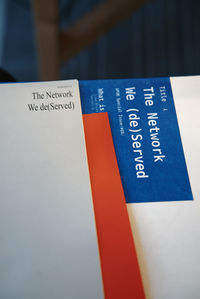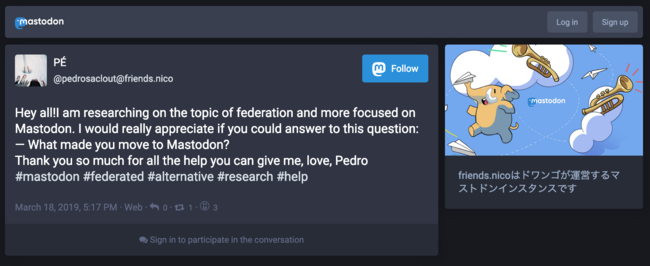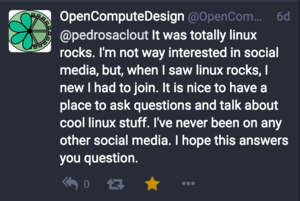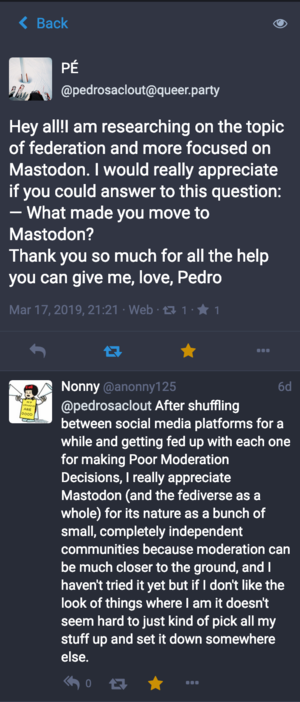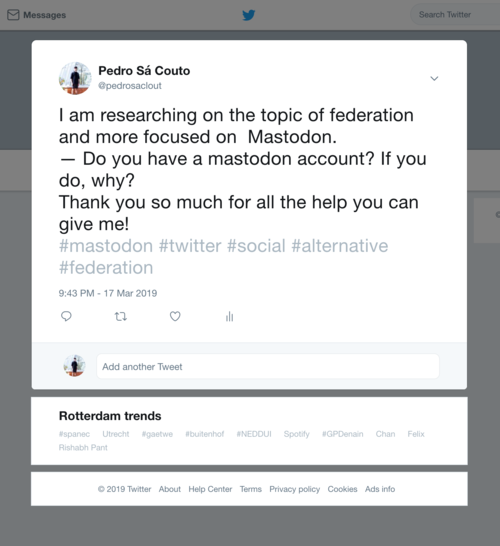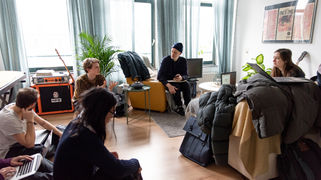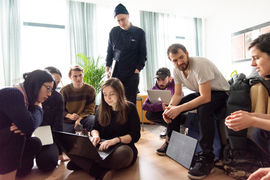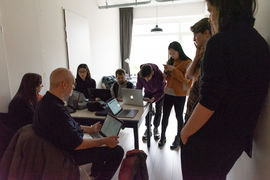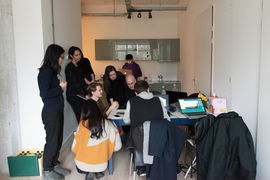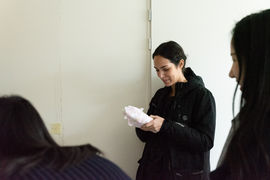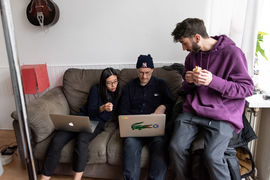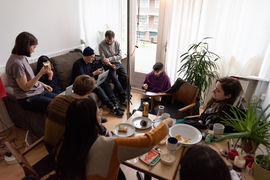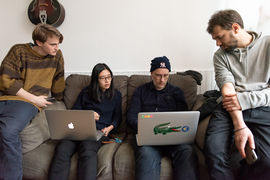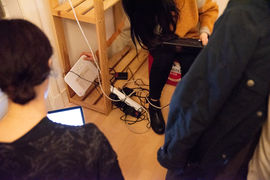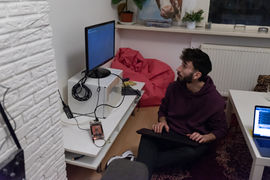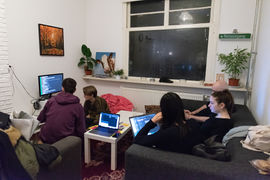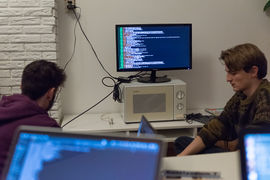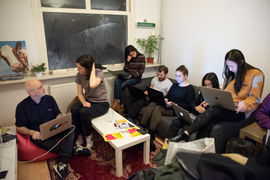User:Pedro Sá Couto/Special Issue 8
Personal Research SI — 8
The Network we (de)Served
The Network We (de)Served — Relying on self-hosting and at the same time managing it. — PDF
The Network We (de)Served - XPUB Special Issue #08 — Photos by Florian Cramer
Relying on self-hosting and at the same time managing it.
We started the special issue 8 by building a small network, a place to communicate, to experiment, to try and to fail. We were introduced to different protocols, and we explored new ways of communicating online. What struck me the most was this small community that we made around these tools and experiments. While we all got through the experience in the different timings, we faced our problems simultaneously. I can now understand how the bugs that we came across made this feeling of being connected even stronger. The feeling of being constantly questioning ourselves and not taking anything for granted.
We all stepped down from our comfort zone. Nowadays we feel like we belong online, we bond through platforms, and we use them without even thinking what is behind them, physically, politically, etc.
I decided to focus my research exactly on the questions that I had along the project probably as a way to understand them, or at least to try, more than actually answering them. Who are the communities that rely on non “mainstream” social media? What was their main reason to move, to gather in different places, how are they ruling themselves, and what boundaries had to be set?
What kind of communities are present on Mastodon, and what brought them there?
I focused my research on Mastodon. A self-hosted online social media, that allows anyone to host their own server and to be a small node in the network. Mastodon is separately operated and divided into different instances but also federated while it can communicate between all these nodes. It seemed the perfect case studie to collect data across the fediverse, hosting different communities with diversified goals.
One can see Mastodon has a place for internet refugees, and I guess I could agree. I started this experience with the idea that it was the perfect safe space, where people were here for a greater good, being marginalized groups that found it as a safe place, or free open source enthusiasts that gathered in an instance to talk about their own concerns. But I guess that it was not only it.
In articles like “Tired of Twitter? Join Me on Mastodon”, published in the well known Wired Magazine on 19th of August 2018, we can see that Mastodon is compared to a child of Twitter, a platform where you micro-blog by tooting, republish posts them as “boosts” and you may also favorite status. I can understand that the author has the same opinion as I did when I first started this journey, he states “Here’s what I think you’ll find: Mastodon users are nice people.”[1]. I guess that you might wonder if what I think about these users is still the same or not but the kind of people present there I do not feel entitled to judge for myself.
One year earlier and almost at the same time of the year on the 18th of August 2017, Ethan Zuckerman, an American media scholar, blogger, and Internet activist also wrote about Mastodon. His article is focused on why this platform is so big in Japan, and what made it bloom. He started by comparing Twitter with the decentralized platform in their core but not only. He talks about what might not be so widely spread when joining this social media, his main point might be illustrated in this paragraph: “In Japan, there’s a distinction between 児童ポルノ – child pornography – and ロリコン – “lolicon”, short for “Lolita complex”. Child pornography is illegal in Japan and seeking it out would be deeply socially unacceptable. Lolicon, which includes animated cartoons and 2D drawings of young men and women in a way that is undeniably sexualized, sometimes through explicit depictions of sexual acts, is legal, widespread and significantly accepted.”[2]. The author does not take one side to the story, he displays in a very efficient way that Mastodon’s growth is inevitably seen closely with this controversial spread of content and that a lot of parties might be disappointed by this fact, while remembering that “it’s worth remembering that controversial content has long been a driver of innovations in communications technology”.
Drawing lines over what one can and cannot do?
Firstly I’ve started by gathering different codes of conduct in different instances and trying to understand patterns on what were the lines drawn by different nodes in the network. Giving an example, in the instance “gravitas.cafe”, that self labels it as a “Luxury Fully Automated Gay Space Communism”, and where there is the need of having an invite to sign up as a user to this server, in their about more page sets these terms for the users:
“We have a zero tolerance policy for anyone breaking any of these rules, and they will result in an immediate suspension from this instance. — Do not participate in, engage in, or boost any form of harassment of other users in the fediverse. — Hate speech and bigotry are not tolerated. This includes, but is not limited to, sexism, homophobia, transphobia, racism, and ableism. — NSFW posts are allowed but must be behind a Content Warning and flagged as sensitive. — Do not follow any of our users with a follow bot. Users please report any follow bots that follow you.”
What I find really interesting about Mastodon is its ability to adapt to different communities. Take for an example Switter, which is sex work-friendly social space, where anyone can join this node. You can, later on, have a look here on their code of conduct (https://assemblyfour.com/switter/code_of_conduct). While gathering all these codes of conduct, I understood that I was mainly focusing on what the instance admins wanted them to be. But is this really how they are ruled? And are people complying with all these sets of rules, restrictions and care within each other? I thought I had to create a space for people to share their experience on Mastodon, a place for the users that are the main core of a social platform to talk for themselves.
Asking the users!
I would like to state that all the instances that I chose as case studies were either because of their online reputation, just as Switter, or because they had the highest relation between active users and toots posted. I had also the concern of choosing instances that in joinmastodon page (https://joinmastodon.org/) belonged to different identities, some of them LGBT, sysadmin, furry, adult content creator, etc.
I made this post:
“Hey all! I am researching on the topic of federation and more focused on Mastodon. I would really appreciate if you could answer to this question: — What made you move to Mastodon? Thank you so much for all the help you can give me, love, Pedro”
To give you a better understanding on how I got the replies that I have, I wanted to get the biggest amount of answers in the smallest timeframe as possible, for that I have created approximately 50 accounts in different instances. All of them had the same user name “pedrosaclout” and the display name was “PÉ”. I also added the same profile picture to all of them. It is interesting that I felt the need to be seen as a real user, I did not want people to think in me as a bot, or a spammer if you might. I also chose the name PÉ because I thought that it was in some sort of way friendlier. I felt I was entering someones private space, their small instances where people “know” each other and I did not want to be a burden for them, I guess this already talks a lot about how I see the platform.
My methodology made me also questions on the topic of federation. Why did I create 50 plus accounts in a federated social platform? The answer is pretty straight forward: it had to be done like this to be faster. I wanted to talk with communities with different goals, I wanted to achieve this in a small timeframe and I guess this was the only way possible. Now that I think about it I can also understand that people probably saw me has part of their node once they could see that I actually had an account there and not in any other place, I was there for them. The federation also did its job, I got answers in certain accounts from users in different instances and that was also great to accomplish!
I am very thankful to everyone who contributed with their comments to my research, I got a lot of great answers and that made me rethink about Mastodon furthermore. While creating accounts in all these instances, I obviously was more successful in some compared to others. It might have because people did not engage so quickly with my toot and it got lost within the timeline, or it might also be because some of them are just too crowded and the speed of toots refreshing is just too fast for you to read a big text! Different instances had clearly different reasons from why they were actually there and that was an interesting result.
For example, in “linuxrock.online”, an instance that describes itself as “A Community-driven instance for people who love Linux. This instance is dedicated to all things Linux and technologies related to it.”, I got this answer from `@OpenComputeDesign` — `@pedrosaclout` It was totally Linux rocks. I’m not way interested in social media, but, when I saw Linux rocks, I knew I had to join. It is nice to have a place to ask questions and talk about cool Linux stuff. I’ve never been on any other social media. I hope this answers your question."[3].
While this, at the same time I could be on “queer.party”, a node that claims itself as being “A silly instance of Mastodon for queer folk and non-queer folk alike.” gathering answers like this one from `@anonny125` — “`@pedrosaclout` After shuffling between social media platforms for a while and getting fed up with each one for making Poor Moderation Decisions, I really appreciate Mastodon (and the fediverse as a whole) for its nature as a bunch of small, completely independent communities because moderation can be much closer to the ground, and I haven’t tried it yet but if I don’t like the look of things where I am it doesn’t seem hard to just kind of pick all my stuff up and set it down somewhere else.”[4].
How can a platform be so rich in its range of users and communities, and how would it be if there was no autonomy given to each admin.
How would you rule such different environments within the same sphere if you didn’t give the right of creating a code of conduct to whoever had the idea to host a server as a place for people to meet people alike?
Comparing the experience on Twitter.
Simultaneously, and just as an exercise I asked the same question on Twitter. I felt like I needed to understand if there would be any kind of interaction. I am a nobody in Twitter, just like I am in every account that I have made, 0 followers, 0 following, this is important because it made it possible to compare in a more straight forward way the difference between both. It ended in a completely different way (https://twitter.com/pedrosaclout/status/1107397057403412480), I had 592 Impressions, 3 engagements, and not one only answer.
[1] NYSTEDT, Brendan. Tired of Twitter? Join Me on Mastodon, WIRED magazine, https://www.wired.com/story/join-mastodon-twitter-alternative/, 19 August 2018 ,seen on (22 March 2019, 16:54).
[2] ZUCKERMAN, Ethan. Mastodon is big in Japan. The reason why is… uncomfortable, http://www.ethanzuckerman.com/blog/2017/08/18/mastodon-is-big-in-japan-the-reason-why-is-uncomfortable/, 18 August 2017, seen on (22 March 2019, 17:22).
BOOKS
File:Kembrew McLeod - Freedom of Expression Resistance and Repression in the Age of Intellectual Property (2007).pdf
File:E. Gabriella Coleman - Coding Freedom The Ethics and Aesthetics of Hacking-Princeton University Press (2013).pdf
File:Mathieu O'Neil - Cyberchiefs Autonomy and Authority in Online Tribes-Pluto Press (2009).pdf
HOME SERVER
Infrastructour
SPECIAL ISSUE meeting
Discussion about the format of the issue
https://pad.xpub.nl/p/SI8-reflections
Editing with Lídia Pereira
13/02/2019
https://pad.xpub.nl/p/special_issue_19_02_13
13/03/2019
https://pad.xpub.nl/p/2019-03-13-rwrm
Seminar with Florian Cramer
14/02/2019
https://pad.xpub.nl/p/14_02_19_Florian_seminar_01
07/03/2019
https://pad.xpub.nl/p/07_03_19_Florian_seminar_02
Readings
The reading questions are meant to guide you through the text, so keep them in mind when reading the text.
Write down concepts that are new to you or difficult to grasp so they can be discussed in class.
Chantal Mouffe, Art & Democracy
https://readingpublicimage.files.wordpress.com/2012/04/mouffe_open14_p6-151.pdf
* What does the author mean by 'Agonism' * What does the author mean by 'Hegemony' * What does the author see as a 'Critical art practice'? * What four forms of 'critical art practices' does the author propose? * What is a critical art practice to you? Where could that practice take place?
Brian Larkin, The Politics And Poetics of Infrastructure
https://sci-hub.tw/10.1146/annurev-anthro-092412-155522
This text is meant as a general introduction to thinking about infrastructure for Anthropologists but it is a very good condensed overview of different approaches to interpreting infrastructure.
* What infrastructure are you currently using to go through this material? What systems are part of that infrastructure? * What is meant by the 'poetics of infrastructure?' * Why is discussing an infrastructure a categorical act? What is the consequence of this act of categorization? * What can be considered as a difference between a technology or system and an infrastructure? * How can an infrastructure operate as an aesthetic or 'fantastical' object?
Sarah Friend, Decentralization and Its Discontents
https://www.youtube.com/watch?v=Km6EYsBYAlY (documentation of talk during Radical Networks, Berlin)
Homebrew homework (for next week):
Prepare for the infrastructour.
- find out the location of your home router
- figure out if you have physical access to it
- figure out the password of your router
- make sure there are free ethernet ports
- make sure there is power available next to your router (for your server)
- Feminist Server Manifesto (2014) -> https://pad.constantvzw.org/p/feministserver (up to line 32)
- What is a federated network? - http://networkcultures.org/unlikeus/resources/articles/what-is-a-federated-network/
homebrewserver.club, Have you considered the Alternative?
https://homebrewserver.club/have-you-considered-the-alternative.html / http://ilu.servus.at/issue9.html
* How can we situate the authors' claim that there are no alternatives? * According to the article, why does cryptography not fully address privacy-related concerns? * What justifies the authors' choice to advocate for alternative approaches, rather than particular apps? * How can 'scale and trust' be understood within the context of federated alternatives?
Zach Blas, Contra-Internet
https://www.e-flux.com/journal/74/59816/contra-internet/
* According to the author, what is the difference between 'disappearing the internet' and 'killing the internet'? * Is it accurate to establish a comparison between the internet and capitalism? Why? * How can we practically explore and perform the paranode as a concept?
Ulises Carrion, The New Art of Making Books
https://monoskop.org/images/4/4e/Carrion_Ulises_Second_Thoughts.pdf
Peter Blasser, An Essay on Worldmaking in Plumbutter
http://www.ciat-lonbarde.net/plumbutter/index.html
Aditya Mandayam, Crux of the Ooze




